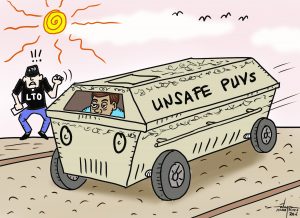Let’s count from one to forty shall we? One, two, three, four, five, six, seven, eight, nine, ten, 11, 12 and so on. By the time we reach forty, there is someone, somewhere across the globe who has decided to end his or her life. Reading this column even takes longer or finishing a mug of your coffee or brushing your teeth or whatever morning routine you may do.
The World Health Organization approximates that one million people die from suicide a year, which represents a global mortality rate of 16 people per 100,000 or one death every 40 seconds. I am telling you, it’s a hard subject to write. I lost count how many times I encountered this kind of appalling incident in my journalism career. I’ve come across myriad of reasons from different backgrounds or status in life. Life’s tragedy or outrageous fortune, traumas and deep seated emotional wounds can be unbearable to some. That’s the simplest reason I can muster to answer the question why.
For this year’s observance of World Mental Health day, WHO highlights on mental health awareness and the need to focus on suicide prevention, what emergency workers, health workers, teachers and employers and just about everyone else in your family and friends, can we do to help prevent suicide. Check the flyer on the WHO website, it provides all the details you need to learn.
Matthias Witzel, a psychologist and psychotherapist based in Switzerland, who has done many years of clinical treatment to various patients in conflict affected countries such as Cambodia, Indonesia and in this country, said there are tell-tale signs a person might be experiencing mental illness.
It’s either they begin to hurt themselves or others. That is a signal that the person needs medical intervention. He said past trauma that remains unresolved may just manifest at present. But it is not just trauma that affect our mental health. Today’s fast paced modern materialistic world and the stress it brings is a risk factor, Witzel said.
“Even in affluent countries, I have many patients seeking treatment. It is not just happening in third world countries,’’ he said.
Governments in poor countries has done little about it, instead they pour a lot of money on military and so little on pressing matters like the health of their citizens.
The International Committee of the Red Cross (ICRC) also acknowledges the need to highlight the importance of mental health
Nearly three in four millennials – 73 percent – surveyed across 15 countries said that mental health needs are as important as water, food, and shelter for victims of wars and armed violence.
The data, taken from a commissioned survey by the International Committee of the Red Cross (ICRC) said more than 15,000 people aged 20 to 35, show growing awareness of the importance of mental health in conflict situations.
Of the 15 countries surveyed, the highest support for mental health among millennials came from Syria, where 87 percent of roughly 1,000 respondents said mental health needs are as important as water, food and shelter for victims of armed conflicts. The next highest countries were Indonesia (82 percent), Ukraine (81 percent) and Switzerland (80 per cent).


